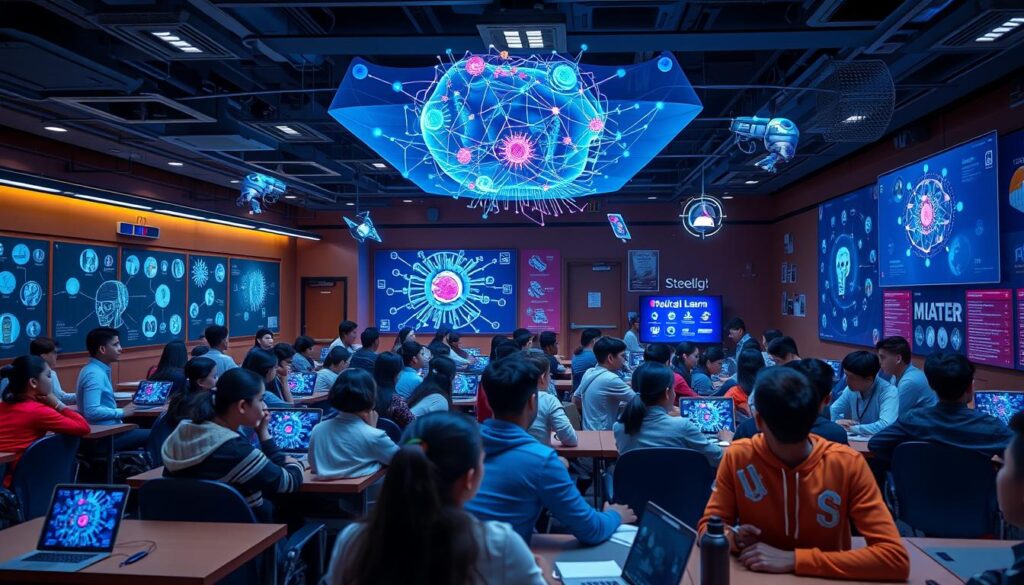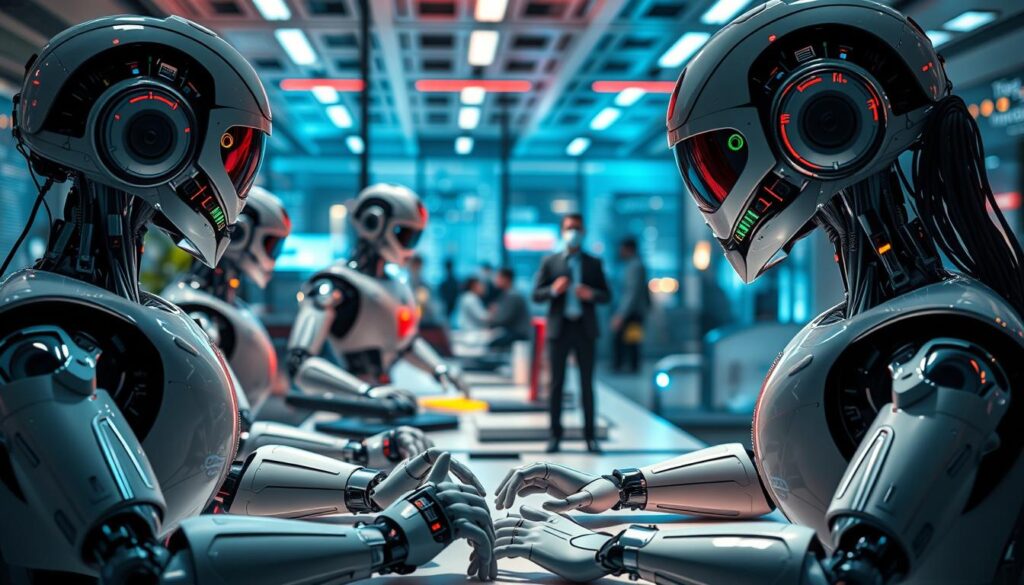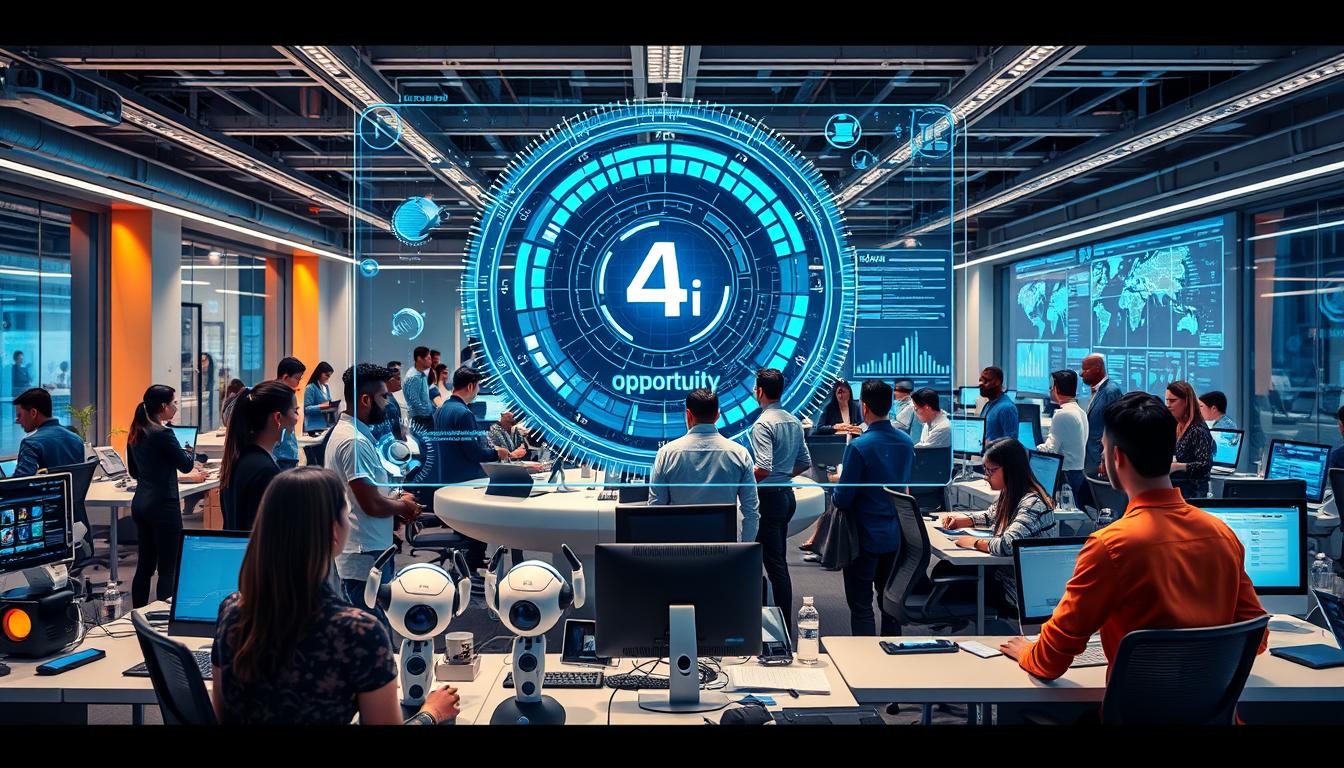Did you know 88% of tech companies now use skills-based hiring? This shows a big change in how jobs are found. As AI grows, new jobs and chances are popping up. To get into the AI job market, you need to learn the right skills.
In the U.S., there are 8.1 million job openings and 7.2 million people looking for work. Knowing how to find AI jobs is key1. This article will help you get ready for a career in AI. We’ll look at the skills and trends that matter in this new job market. For more on AI careers, check out this resource.
Key Takeaways
- Understanding the AI job market can open doors to new opportunities in the workforce.
- Identifying the skills required for a career in AI is crucial for staying competitive.
- The demand for AI professionals is on the rise across various industries.
- Adapting to the evolving AI landscape requires continuous learning and upskilling.
- Networking and community engagement can enhance your prospects in the AI field.
Understanding AI Jobs and Their Impact on Employment
Artificial intelligence jobs are changing the job market. As AI becomes more common, it’s key to know about these roles. This is important for those interested in AI careers or wanting to become AI professionals.
What Are AI Jobs?
AI jobs involve working with AI tools in many fields. A report by McKinsey & Company says AI will create 20-50 million new jobs by 20302. This means people will need to learn new skills.
Types of Roles in AI
AI has led to many new job types. Jobs like AI prompt engineer, AI ethicist, and machine manager are now common. A World Economic Forum report says AI will create new jobs but also replace some old ones in finance, media, and law3.
Skills Required for AI Positions
To succeed in AI, you need technical and soft skills. People should work on skills like thinking analytically, being creative, and communicating well. Getting a Master of Science in Applied Artificial Intelligence can help you stand out in this field3.
The Growing Demand for AI Professionals
The AI job market is changing fast, showing a big need for AI experts in many fields. Companies are now seeing the value of using AI, leading to more job openings. With new tech in automation and data, many jobs are changing to fit these advancements.
Industry Trends Driving AI Adoption
Businesses are racing to use AI to stay ahead. Studies show that 72 percent of companies are using AI, planning to spend more on it4. Careers in AI are expected to grow by 21 percent by 20314. Yet, 55 percent of leaders worry about finding the right people for these roles soon5.
Global Perspectives on AI Job Growth
AI is changing the job world, offering chances for both tech and non-tech folks. Jobs mentioning AI get 17 percent more applicants than those that don’t5. In the U.S., AI jobs make up about 2 percent of all job ads5. These jobs also pay more, by over 77 percent, making them very appealing5.

| Role | Average Salary Range (USD) |
|---|---|
| Machine Learning Engineer | $103,000 – $251,000 |
| NLP Scientist | $154,000 – $253,000 |
| Data Scientist | $77,000 – $198,000 |
| Business Intelligence Developer | $71,000 – $145,000 |
AI is changing how we work and what jobs we have. Leaders expect a big change in business processes with AI at the heart in five years5. As companies look to innovate, learning AI skills will help you stay ahead in this fast-changing world.
Essential Skills for a Career in AI
Starting a career in artificial intelligence needs both technical and soft skills. Those who do well in AI careers have key skills that many employers want today.
Technical Skills: Programming and Data Analysis
Knowing programming languages like Python, Java, and R is crucial for many AI jobs. Being good at data analysis helps you find important insights in big datasets. Machine learning and data analysis are very important, as 79% of business and technology leaders say AI will change their fields soon6. Also, the need for Data Scientists is expected to grow by 35% by 20326.
Soft Skills: Communication and Problem-Solving
Soft skills are also key for success in AI careers. Being able to communicate complex ideas well is important. Problem-solving skills are also crucial, as many organizations struggle to find people with AI skills7.
Doing independent research projects can help improve your problem-solving skills. This prepares you for the challenges in the changing job market. In AI jobs, being able to turn data insights into useful strategies is a big plus.
| Role | Average Base Salary | Top Earners Salary |
|---|---|---|
| Machine Learning Engineer | $129,000 | $178,000 |
| Data Scientist | $123,000 | $173,000 |
| Robotics Engineer | $106,000 | $156,000 |
| Software Engineer | $148,000 | $205,000 |
| Business Intelligence Developer | $112,000 | $150,000 |
Navigating Career Paths in AI
The world of AI careers is changing fast, offering many paths for job seekers. Entry-level AI opportunities are growing as companies look for new talent. This is because AI is becoming more important in our work lives.
Entry-Level Opportunities in AI
With AI getting more use, there are jobs like AI interns, data analysts, and junior machine learning engineers. It’s said that 5% of jobs might be taken over by AI, but 30% of tasks could be done by AI assistants. This means new jobs that focus on human skills like creativity and ethics8.
Also, 33% of employers worry that new graduates don’t have the right skills for these jobs. This is because of a skills gap9. So, if you want a career in AI, you need to work on your technical and soft skills.
Transitioning from Other Fields to AI
If you’re thinking of moving to AI from another field, you can use your current skills. Skills like analytical thinking, project management, and creativity are valuable. Learning more about AI through workshops or online courses can also help you get hired.
By 2030, millions might need to change jobs because of AI. This shows how important it is to have skills that can adapt to new technology9. It’s crucial to keep learning and be prepared for the changing job market.

The Role of Education in AI Careers
Education is key in starting a career in artificial intelligence. Getting a solid education prepares you for the AI job market’s challenges. You’ll find many degree programs and certifications that lead to sought-after jobs.
Degree Programs and Certifications
Computer science, data science, and engineering degrees are the base for AI education. These programs teach you critical skills needed to succeed. Getting certifications in machine learning and data analysis is also crucial, as employers look for them.
The US Bureau of Labor Statistics predicts a 23% job growth in computer and information research by 2032. This shows the growing need for graduates with the right qualifications10.
Online Learning Platforms for AI Skills
Online platforms like Coursera and Udemy let you learn AI skills at your own pace. They offer courses on new technologies and fill educational gaps. AI innovations also make learning more personal, helping teachers and students11.
It’s also important to include 21st-century skills in education. This prepares students for the fast-changing job market11.

| Degree/Certification | Average Salary | Job Growth (2022-2032) |
|---|---|---|
| AI Engineer | $113,000 | 23% |
| Machine Learning Engineer | $123,000 | 23% |
| Data Scientist | $127,000 | 23% |
| Data Engineer | $104,000 | 23% |
| Robotics Engineer | $99,000 | 23% |
| Software Engineer | $119,000 | 23% |
Investing in AI-focused education boosts your earning potential and job prospects1110.
Networking and Building Your AI Community
Building a strong network in AI can boost your career. Joining AI groups helps you show off your skills and make important connections. These groups also keep you updated on the latest trends and events.
Joining AI Professional Groups
Being part of AI groups has many benefits. They help you meet experts in the field and learn about AI careers. You’ll also find out about new tech and job chances through their events and webinars12.
Attending AI Conferences and Workshops
Going to conferences and workshops is great for networking. These events are where you meet potential employers and learn from others. Being real and active can help you grow your career in AI12.
Also, getting involved in these events can improve your leadership skills. It helps you share ideas and learn from others12.
The Future of Work: AI and Job Automation
AI is changing how we work, making it possible for humans and machines to work together. It’s taking over simple tasks in areas like manufacturing, customer service, and finance. This lets people focus on more complex and creative tasks, making work more fulfilling and productive.
How AI is Reshaping Traditional Roles
AI is changing what jobs look like. By 2030, up to 30% of US jobs could be automated, especially with tools like generative AI13. But, jobs in STEM, business, and creative fields might see improvements without losing many jobs. This shows a big change in how work will be done in the future.
Opportunities for Collaboration Between Humans and AI
AI is creating new ways for humans and machines to work together. Tools like ChatGPT are seen as colleagues, not just machines, helping save time and increase productivity14. Companies might also use AI to manage work better, making decisions and improving workflow15. This partnership will help solve the problems of automation and create new opportunities for workers to adapt to new technologies.
Preparing for AI Job Interviews
AI job interviews are becoming more common, making it crucial for candidates to improve their preparation. By 2024, about four in 10 companies will use AI for interviews16. Some interviews are fully automated, using algorithms to judge candidates based on their voice and words16. Knowing the types of questions can greatly improve your chances of doing well in AI interviews.
Common Interview Questions in AI
Interviewers often ask about technical skills like programming and AI applications. You might be asked about your experience with generative AI, especially in finance and tech17. It’s important to show your skills through real-world examples.
How to Showcase Your AI Projects
Having a portfolio that shows your AI experience is key. Show how you’ve used AI to solve real problems. It’s wise to be professional, use job keywords, and practice a lot with tools like AI interview coaches16.
Practice with simulations, record mock interviews, and get feedback from others. This will help you prepare for the unique challenges of AI interviews16. Remember, these interviews can be tough because you don’t get feedback right away, so preparation is essential.

Adapting to the Evolving AI Landscape
The world of artificial intelligence (AI) is changing fast. It’s key to stay informed and adapt quickly. Keeping up with AI news is not just good; it’s vital for your job and growth.
Reading industry publications, going to workshops, and taking online courses can really help. As AI grows, so does the need for experts in ethics and governance1819.
Staying Updated with AI Innovations
Use online platforms like Coursera and Udacity for AI courses. These sites offer deep dives into AI and related tech. Whether you’re new or experienced, learning AI can boost your career.
Automation in places like Amazon and healthcare shows the need for constant learning. It helps you stay ahead of new job roles1819.
Continuous Learning and Professional Development
Always aim to improve your skills. Join coding boot camps, technical training, and network with experts. This way, you learn new skills and understand AI’s ethics and challenges.
This mindset can lead to specialized and leadership roles. It makes you a valuable asset in the changing job market1819. For more on adapting to AI, check out this resource.
FAQ
What types of jobs are available in the AI job market?
What skills do I need to develop for a career in AI?
How can I transition into an AI career from another field?
What educational background is needed for a career in AI?
How important is networking for advancing in the AI field?
What should I expect in an AI job interview?
How can I keep my skills relevant in the rapidly changing AI landscape?
What industries are currently driving demand for AI professionals?
Source Links
- How AI And Skills-Based Hiring Are Reshaping The Job Market – https://www.forbes.com/sites/karadennison/2024/10/14/how-ai-and-skills-based-hiring-are-reshaping-the-job-market/
- Innopharma Education Blog – https://www.innopharmaeducation.com/our-blog/the-impact-of-ai-on-job-roles-workforce-and-employment-what-you-need-to-know
- 4 Ways AI Impacts the Job Market & Employment Trends – https://onlinedegrees.sandiego.edu/ai-impact-on-job-market/
- Jobs That Are Growing With the Rise of AI – https://partnerstack.com/articles/ai-job-growth
- AI-Skilled Workers Are The New, Hot, In-Demand Professionals – https://www.forbes.com/sites/jackkelly/2024/08/01/ai-skilled-workers-are-the-new-hot-in-demand-professionals/
- The Top Skills You Need for AI Jobs in 2024 — Multiverse – https://www.multiverse.io/en-US/blog/top-ai-skills
- What Skills Do I Need to Get a Job In Artificial Intelligence? – https://www.northumbria.ac.uk/study-at-northumbria/courses/msc-computer-science-with-artificial-intelligence-distance-learning-dtdsar6/artificial-intelligence-skills-blog-org/
- AI and the Workforce: Navigating the Impact and Opportunities – https://www.flexjobs.com/blog/post/ai-and-the-workforce-navigating-the-impact-and-opportunities-of-artificial-intelligence/
- How AI is Reshaping Career Pathways – https://resources.twc.edu/articles/how-ai-is-reshaping-career-pathways
- 6 Artificial Intelligence (AI) Jobs to Consider in 2024 – https://www.coursera.org/articles/artificial-intelligence-jobs
- The role of AI in education and the changing US workforce – https://www.brookings.edu/articles/the-role-of-ai-in-education-and-the-changing-u-s-workforce/
- “Networking: The Secret Weapon for Career Success in the AI Era” – https://www.linkedin.com/pulse/networking-secret-weapon-career-success-ai-era-mohit-uppal
- Generative AI and the future of work in America – https://www.mckinsey.com/mgi/our-research/generative-ai-and-the-future-of-work-in-america
- The future of work: How will AI and automation affect work? – https://www.uc.edu/news/articles/2023/05/the-future-of-work–how-will-ai-and-automation-affect-work.html
- Insights on Generative AI and the Future of Work – https://www.commerce.nc.gov/news/the-lead-feed/generative-ai-and-future-work
- Your next job interview might be with AI. Here’s how to ace it. – https://www.cbsnews.com/news/ai-job-interview-tips-to-prepare-artificial-intelligence/
- Your Guide to Preparing for Future Careers With a Focus on AI – https://vidcruiter.com/blog/ai-job-market/
- AI and the Future of Work | National Fund for Workforce Solutions – https://nationalfund.org/ai-and-the-future-of-work/
- AI and the Future of Work: Adapting to a Changing Job Market – https://www.linkedin.com/pulse/ai-future-work-adapting-changing-job-market-arpit-apoorva-sdi5f



